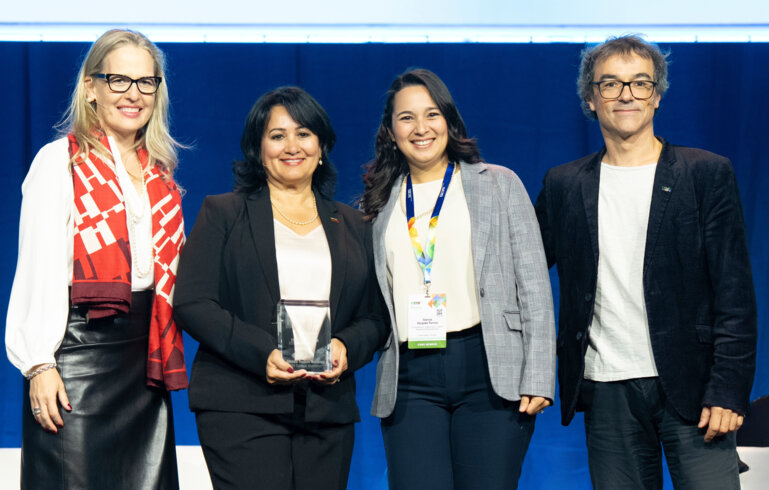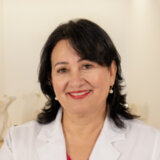Glenda Ramos Martínez receives the ESMO Oncologist of the Year Award, launched this year by the Society
When Glenda Ramos Martínez started medical school, her mother was diagnosed with breast cancer at the age of 45. At that time, Ecuador had very few oncologists and she had to travel to the USA to receive appropriate treatment. That personal experience revealed to a young Dr Ramos the urgent need for access to care in her own country, an insight that has guided and inspired her career ever since.
Today, Dr Ramos has more than 30 years of experience in haematology, oncology and hospital leadership: she has been Chief of Medicine at Sociedad de Lucha Contra el Cancer (SOLCA), the country’s leading oncology hospital, for more than a decade. She also served as the Director of the Internal Medicine Residency Programme at Universidad de Especialidades Espíritu Santo (UEES), and as Professor of Oncology for medical students, residents and fellows at three medical schools: Universidad Católica de Santiago de Guayaquil (UCSG), Universidad de Guayaquil and UEES. Dr Ramos has helped bolster oncology training, expand continuing medical education programmes, and advocate for improved access to cancer therapies throughout Ecuador.
Over the course of your career, how have accessibility and availability of high-quality cancer care evolved in the country?
While many high-cost medicines are still not available in Ecuador, in the last 30 years significant efforts at a national level have helped make essential therapies more accessible to those who need them. As a member of the National Commission of Medicines and Supplies – responsible for evaluating new molecules proposed for inclusion in the national essential medicines list and ensuring patient access – I have focused primarily on expanding access to first- and second-line treatments, such as nab-paclitaxel, pembrolizumab and trastuzumab emtansine. I have also contributed to the development of clinical practice guidelines, supported prevention programmes and received training in health technology assessment, strengthening my work on the national therapies commission to improve patient access to medicines.
More recently, the narrative of cancer has started to change in Ecuador and as part of this, I am currently leading a community crusade called ‘Don’t Give Cancer a Chance’ (No le des chance al cáncer), which uses radio and television to raise awareness about risk factors, prevention, screening and the importance of early diagnosis, and hopes to reduce the fear of cancer treatment. Working alongside others, I am also creating a non-profit foundation to support patients with cancer and fund continuous medical education and research.
You are considered to be the first female medical oncologist in Ecuador. What obstacles have you faced in your career, if any?
Like many countries in Latin America, Ecuador has long been male dominated. When I chose oncology, the specialty was led entirely by men. At the time there were just five oncologists in the hospital: four men and me, the youngest and the only woman. With faith, determination, perseverance and the support of colleagues and friends, I moved forward. The journey was not easy. I faced opposition, resistance and many obstacles, but I remained focused on what mattered most: providing patients with the best possible care, ensuring they are treated with dignity and compassion, advocating for access to essential medicines, and training the next generation of doctors. Today, it is deeply inspiring to see how far we have come. Women now make up the majority of oncologists in Ecuador – approaching 60%.
How have you have helped to strengthen oncology training in Ecuador?
When I served as President of the Ecuadorian Society of Oncology, one of my proudest accomplishments was bringing the ‘Best of ASCO’ to my country in 2011. This gave oncologists and other specialists access to the latest cancer research advances. I am grateful that this programme continues through the work of subsequent presidents. My biggest joy, however, is seeing young doctors specialising in oncology after working with me, apparently inspired by my compassion and sense of purpose, my hope for positive outcomes and by my mentorship. And on a personal level, nothing makes me prouder than knowing my daughter has followed this path as a breast cancer specialist, practising in the USA.
What advice would you give to others on a similar path?
To young physicians, I would say: remember that medicine is always a team effort. And never forget that behind every clinical case are people and families who are suffering and are afraid. We must always be honest and clear, but above all, we must speak to them with our hearts.
While setting clear goals is important, life sometimes takes us on unexpected detours and often, these detours allow us to impact more people than we could have imagined. I did not expect to play a role in expanding access to cancer medicines for so many patients, and I never imagined I would receive recognition of this magnitude.



